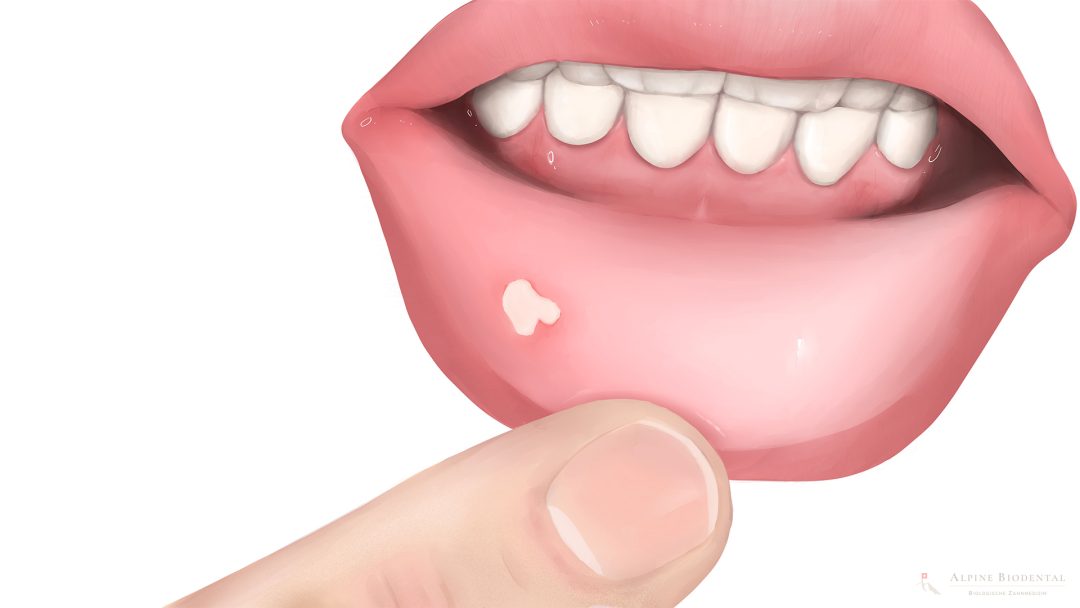Ulcers in the Mouth

Aphthous ulcers, also known as aphthae or colloquially as canker sores, are a common oral issue that affects many people. Although the correct spelling is “aphthae,” the terms “aphthous ulcer” or simply “canker sore” are often used. These small, painful lesions in the oral cavity can have various causes and are often a reason for a visit to the dentist. In this article, we will focus on the manifestations of aphthous ulcers in the mouth and discuss why they occur so frequently in this area.
What are Aphthous Ulcers, and where do they occur?
Aphthous ulcers are small, painful ulcerations that often form in the oral region. They typically appear as round or oval blisters with a white or yellowish center and a red border. While they can occur anywhere on the body, this article exclusively focuses on aphthous ulcers in the oral region, including the tongue, palate, and inner cheek sides.
These small lesions can have various causes, from stress and hormonal changes to nutritional deficiencies or reactions to specific foods. While aphthous ulcers are generally harmless and heal on their own, they can cause considerable discomfort. It is important to understand that, although they are often confused with herpes, aphthous ulcers are not contagious.
Children can also be affected by aphthous ulcers in the mouth, although they are not the primary target audience of this article. It is crucial for parents to recognize the signs and consult a dentist or pediatrician if necessary.
In the following sections, we will delve into the symptoms, causes, and treatment options for aphthous ulcers in the mouth to provide a comprehensive understanding of this common oral condition.
Symptoms associated with Aphthous Ulcers
When it comes to oral health, aphthous ulcers are a common concern in dental practices. These small, painful lesions in the mouth can be very uncomfortable for those affected. The symptoms of aphthous ulcers are diverse and often include visible signs such as blisters and sores in the oral cavity.
Blisters in the Mouth
Patients who come to us with complaints often report typical symptoms seen in medical images. These images clearly show the characteristic white or yellowish blisters with an inflamed red border, which can occur on the oral mucosa, gums, or even the tongue. Affected individuals may describe aphthous ulcers as pimples or blisters on the tongue.
Blisters can also appear in the throat area, often associated with difficulty swallowing. These throat blisters are not only uncomfortable but can also significantly impact well-being. Aphthous ulcers can also develop on the palate, manifesting as pimples or blisters, leading to pain during eating or speaking.
Another common location for aphthous ulcers is the gum line. Ulcers on the gums can be particularly painful as they are irritated by daily activities such as brushing teeth or eating.
Inflamed oral Mucosa and Lips
Aphthous ulcers are small inflamed areas of the oral mucosa. Consequently, typical signs of inflammation, such as pain, redness, swelling, and warmth, are associated with the symptoms. The open sore allows bacteria to enter the mucosa, leading to the spread of inflammation, affecting larger areas of the oral mucosa. Inflammation due to aphthous ulcers can also extend to the lips. Inflamed lips are red, sensitive to touch, and exhibit swelling. Inflammation of the oral mucosa and lips can pose a challenge in treatment.
In our dental practice, we regularly encounter patients with these symptoms. Our goal is not only to provide effective treatment but also to raise awareness of this common condition and improve the quality of life for our patients.
Burning Sensation in the Mouth and on the Lips
The open sores in the oral mucosa can cause a burning sensation. Especially when consuming spicy, acidic, or salty foods, aphthous ulcers are irritated, leading to a burning feeling. As inflammation can spread to the mouth and lips, the burning sensation may affect both areas.
Causes of Aphthous Ulcers in the Mouth
The causes of aphthous ulcers in the mouth are diverse and can vary from individual health factors to external influences. It is essential to understand that, although aphthous ulcers are often uncomfortable, they are generally harmless and non-contagious. The exact cause of these small, painful ulcers in the mouth can be challenging to determine, but there are some known factors that can contribute to their occurrence.
One of the main reasons for the development of aphthous ulcers in the mouth is a reaction to specific foods. Some people find that certain foods, especially those with high acidity, such as citrus fruits, tomatoes, or spicy spices, increase the risk of aphthous ulcers. Food allergies or intolerances can also play a role.
Another factor that can contribute to the development of aphthous ulcers is injuries in the oral region. These can be caused by accidentally biting the inside of the cheek, using hard toothbrushes, poorly fitting braces, or sharp edges on teeth or fillings.
Stress is also a known trigger for aphthous ulcers. Periods of high stress can weaken the immune system, increasing susceptibility to aphthous ulcers.
Additionally, hormonal changes, such as those occurring during menstruation, pregnancy, or puberty, can cause or increase the frequency of aphthous ulcers. Genetic factors also play a role, as individuals with family members prone to aphthous ulcers have a higher risk.
Other factors that can contribute to the development of aphthous ulcers include certain medications, nutrient deficiencies (such as iron deficiency, vitamin B12 deficiency or folate deficiency), and certain diseases that affect the immune system, such as gluten intolerance or Crohn’s disease.
The use of toothpaste with many chemical substances can promote the formation of aphthous ulcers. In particular, the substance sodium lauryl sulfate has adverse effects and should be avoided. We recommend using a high-quality organic toothpaste.
An unfavorable bacterial flora in the mouth increases the chance of an aphthous ulcer becoming infected, leading to a painful inflammation of the oral mucosa or lips. To prevent inflammation and expedite the healing of aphthous ulcers, it is crucial for affected individuals to build up their oral flora.
In summary, the most common causes of aphthous ulcers in the mouth include:
- Reactions to Foods: Particularly acidic foods like citrus fruits and tomatoes can trigger aphthous ulcers. Spicy spices or food allergies and intolerances can also play a role.
- Oral Injuries: Small injuries in the mouth, caused by accidental biting, hard toothbrushes, ill-fitting braces, or sharp edges on teeth and fillings, can lead to aphthous ulcers.
- Stress: High stress levels can compromise the immune system and increase susceptibility to aphthous ulcers.
- Hormonal Changes: Hormonal fluctuations during menstruation, pregnancy, or puberty can favor the occurrence of aphthous ulcers.
- Medications: Some medications can cause aphthous ulcers as a side effect.
- Medikamente: Einige Medikamente können als Nebenwirkung Aphthen verursachen.
- Nutrient Deficiency: Deficiencies in iron, vitamin B12, and folic acid may be associated with the occurrence of aphthous ulcers.
- Immune System Disorders: Certain diseases affecting the immune system, such as celiac disease, Crohn's disease, and others, can also trigger aphthous ulcers.
- Unfavorable Oral Bacterial Flora: If an unhealthy bacterial flora is present, the likelihood of an aphthous ulcer becoming infected and causing painful inflammation of the oral mucosa or lips increases.
- Toothpaste with Sodium Lauryl Sulfate: Sodium lauryl sulfate in toothpaste is suspected to promote the development of aphthous ulcers and should be avoided.
It is important to consult a dentist or physician for recurring or particularly painful aphthous ulcers to determine the underlying causes and find appropriate treatment. In our dental practice, we emphasize not only providing effective treatment for aphthous ulcers but also offering preventive measures and advice to minimize the risk of their occurrence.
Treating Aphthous Ulcers
Treating aphthous ulcers, the small, painful sores in the mouth, is a topic that concerns many and often raises questions. Fortunately, there are various methods to treat these unpleasant lesions and alleviate discomfort.
One of the first questions that individuals often ask is, “What helps against aphthous ulcers?” The good news is that there are a variety of treatment options, both in the form of medications and home remedies. Medications for aphthous ulcers typically include topical applications such as creams, gels, or mouthwashes applied directly to the affected area. These remedies can help alleviate pain, reduce inflammation, and expedite the healing process.
Home Remedies for Aphthous Ulcers
In addition to medication-based treatment, various home remedies can be effective against aphthous ulcers in the mouth. These home remedies are often easy to apply and can provide quick relief of symptoms. Some popular home remedies for aphthous ulcers include:
- Saltwater Rinses: A simple and effective method to reduce inflammation and cleanse the oral cavity is rinsing with a saltwater solution.
- Baking Soda Paste: A paste made from baking soda and water can be applied directly to the aphthous ulcer to neutralize the pH in the mouth and alleviate discomfort.
- Chamomile Tea Compresses: Chamomile tea has anti-inflammatory properties and can be applied as a soothing compress to the affected areas.
- Honey: Honey is known for its antibacterial and healing properties and can be applied directly to the aphthous ulcer to relieve pain and promote healing.
- Aloe Vera: The gel from the Aloe Vera plant can help alleviate pain and support the healing process.
- Ozone Therapy: Directly applied ozone therapy can significantly accelerate the healing of aphthous ulcers and quickly relieve pain.
It is important to emphasize that while home remedies can often provide relief, they may not be suitable for everyone, and in the case of persistent or particularly painful aphthous ulcers, seeking medical advice is recommended. In our practice, we place great importance on addressing the individual needs of our patients and finding the most suitable treatment method for them, whether through home remedies, medications, or a combination of both.
Dr. med. dent. Rebekka Hueber
Aphthous ulcers are painful and can affect the quality of life. Infection of these small lesions should be strictly avoided.

Frequently asked Questions about Aphthous Ulcers in the Mouth
Aphthous ulcers in the mouth are a common and often bothersome issue, prompting many affected individuals to have similar questions. Below is a list of frequently asked questions on this topic. If any questions remain unanswered after reading, do not hesitate to contact us.
No, aphthous ulcers are not contagious. They are triggered by internal factors such as stress, nutritional deficiencies, or hormonal fluctuations, not by viruses or bacteria.
Aphthous ulcers are small, painful sores in the mouth, while fistulas are typically channels connecting an abscess to the oral cavity. Both have different causes and treatments.
To alleviate aphthous ulcers, saltwater rinses, specific medicated mouthwashes, gels, chamomile tea compresses, and avoiding irritating foods can be helpful.
When an aphthous ulcer is open, it is crucial to avoid infection. Keep the area clean, refrain from consuming sharp or acidic foods, and use pain-relieving and healing-promoting remedies.
No, lancing aphthae is not recommended. It can lead to infections and further complications. It is better to wait for natural healing or use suitable treatment methods.